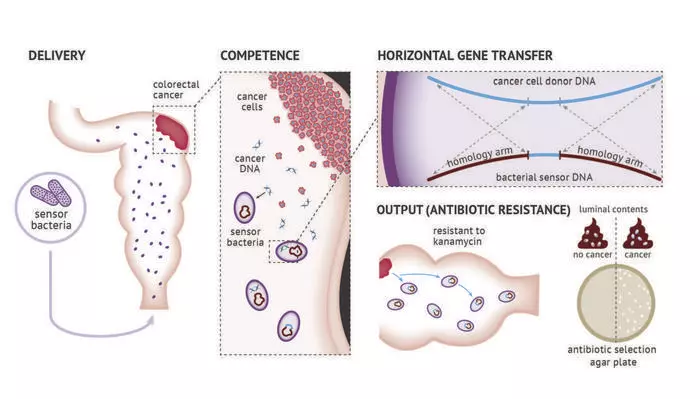Certain gut bacteria have been linked to colon cancer, but now they might get a chance at redemption. Scientists have engineered “pickpocket” bacteria to detect colorectal cancer, with a 100% success rate in mouse tests.
The bacteria species in question is known as Acinetobacter baylyi, which has the ability to collect DNA from its environment and stash it in its own genome, potentially granting it new traits. This is known as natural competence, and for the new study, researchers set out to hack this ability to use the bug to potentially detect cancer.
Tumors tend to shed fragments of their DNA into the environment around them. So, the team used the CRISPR gene-editing tool to engineer A. baylyi so that it would target a particular mutation in the KRAS gene, which is associated with cancer. If it was present, the bacteria would incorporate that gene into its own genome, triggering a specific signal that doctors could detect as a patient being positive for cancer.
In practice, the bacteria would be released into part of the body, such as the colon. If they encounter cancer-associated gene mutations, they take up that DNA which then allows them to resist antibiotics. Later, the bacteria are recovered from stool samples and placed onto a lab dish lined with antibiotics. If the bacteria fail to colonize the dish, it means their genomes are unchanged and as such, no cancer was present. If they do grow, however, it indicates the presence of cancer or precancerous polyps.

The researchers call the technology Cellular Assay of Targeted CRISPR-discriminated Horizontal gene transfer (CATCH). In tests in mice, the system was 100% accurate in detecting the presence or absence of colorectal cancer.
“It was incredible when I saw the bacteria that had taken up the tumor DNA under the microscope,” said Josephine Wright, co-lead author of the study. “The mice with tumors grew green bacterial colonies that had acquired the ability to grow on antibiotic plates.”
The team says that this technology could not only help diagnose colorectal cancers earlier, but could be adapted to treat the disease. It could also be applied to other forms of cancer, and even other scenarios where specific types of DNA need to be detected.
The research was published in the journal Science. The team describes the work in the video below.
Source: UC San Diego via Eurekalert




